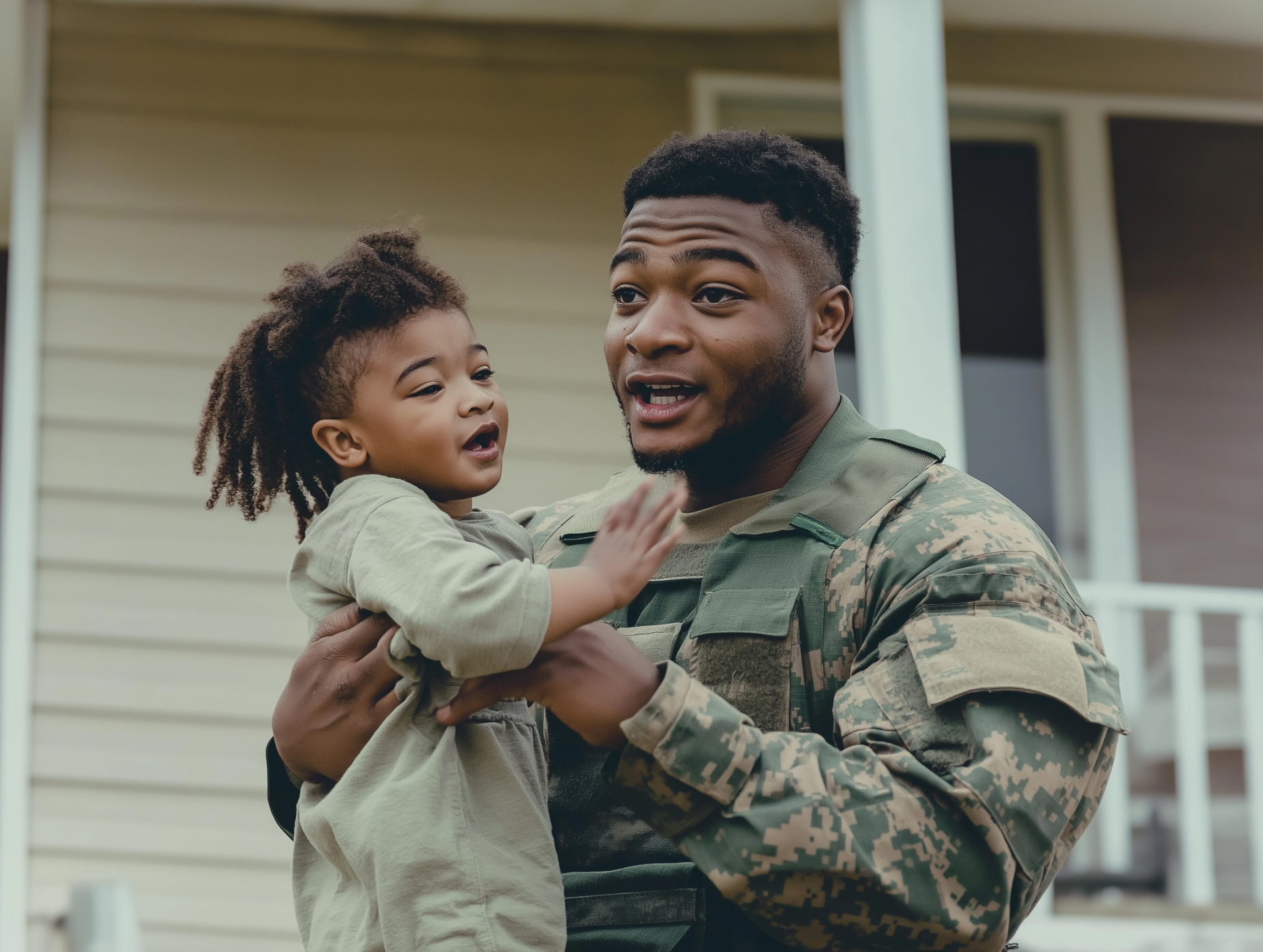After two long years overseas, Sergeant Michael Torres finally stepped off the bus onto his street. The autumn air felt sharper, thinner, almost foreign. He had expected relief, the warmth of a reunion. Instead, his chest tightened with a dread he couldn’t name, as if home itself had shifted in his absence.
He barely had time to set down his duffel before his daughter, Emily, tore across the pavement and threw herself into his arms. He lifted her high, her laughter ringing like music. Then she pressed her lips to his ear and whispered words that froze him: “Daddy, you have to know Mom’s secret…”
Michael’s arms stiffened around her small frame. His heart hammered with the echo of combat, though no gunfire rang here. He kissed her hair, forcing a smile for the neighbors watching, but inside, unease curled like smoke. Only two years gone, and already something at home didn’t add up…
Inside their modest home, Sarah rushed forward, wrapping him tightly. Her kiss was warm, but her eyes darted, finding his again. Michael chalked it up to nerves. After years apart, reshaping their rhythm would take some time. Still, her smile trembled in a way he couldn’t quite ignore.

The house smelled faintly different—fresh paint, lemon cleaner, a touch of something new. Familiar furniture was in place, but curtains had been changed, a rug swapped out. Harmless changes, surely, yet Michael felt a faint disconnect, as though stepping into a memory that had been carefully altered.
Neighbors soon gathered, offering cautious hugs and congratulations. Some clasped his hand warmly, while others kept their greetings short before hurrying away. He figured they were giving him space after deployment, though an odd undercurrent hung in the air—almost like an unfinished sentence everyone seemed too polite to speak aloud.
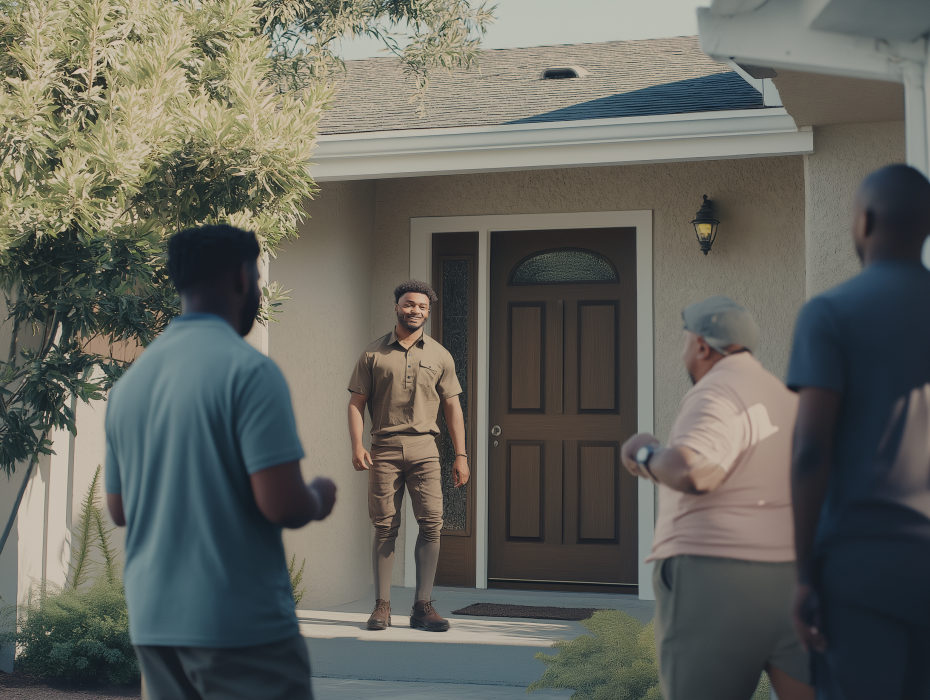
Emily stuck close to his side, chattering brightly about school projects and new friends. Then, with the artless seriousness of a child, she whispered, “Where’s my friend? I wanted him to meet Daddy.” Michael chuckled, assuming she meant a neighbor or a friend, but Sarah quickly cut in, changing the subject.
That night, Michael lay awake listening to Sarah breathe beside him. She asked questions about his deployment, her voice a mix of curiosity and hesitation. He answered in vague and broad strokes, sensing she wanted reassurance more than details. Still, the way she avoided his eyes when silence fell pricked at him.

A dream jolted him awake at dawn—sand, shouting, and then a rattling door. Heart racing, he walked to the kitchen, staring at the calm street outside. The world looked peaceful, but the unease clung like fog. He brushed it off as adjustment trouble, common among veterans, though the feeling lingered.
Emily bounced into breakfast, dropping her stuffed bear onto the table. “He doesn’t like the attic either,” she announced, chewing toast. Michael raised an eyebrow. “Who’s he?” Before Emily could reply, Sarah chuckled, wiping her hands. “Just one of her games. She’s always inventing things and people. Don’t encourage it.”

Michael let it slide, though the edge in Sarah’s tone caught his attention. He watched Emily swing her legs under the chair, humming cheerfully, while Sarah busied herself at the counter. The scene was ordinary, almost perfect, yet Emily’s strange phrasing stuck in his mind long after breakfast was over.
In the days that followed, Michael slipped into household routines. He ran grocery errands, fixed a squeaky hinge, and helped Emily with homework. For a moment, it felt like normalcy was returning. But then he noticed three tickets for a play in the closet.

When he asked about it, Sarah laughed lightly. “Oh, Emily and I watched the Peppa Pig adaptation with my friend Anna.” Her explanation was easy, plausible. Michael nodded, letting it go. Yet later, something about the way she had explained it seemed wrong. However, it seemed a minor thing.
One evening, Emily tugged at his sleeve, whispering about a “secret room.” She giggled before he could ask more, then pointed at Sarah’s locked desk drawer. “Mom told me not to touch.” Michael smiled at her mischief, but his chest tightened. Children invented things, yet, their truths sometimes slipped through.

Sleep came fitfully. The creak of pipes and the hum of the refrigerator kept him on edge, sounds he wasn’t used to for some time now. Each groan of the house stirred his nerves, though he reminded himself it was civilian life he had to readjust to. Still, rest never stayed long.
At a neighborhood cookout, Michael overheard two men murmuring before his approach. Their words hushed, replaced by tight smiles. He caught only fragments—“she managed” and “rough patch.” He assumed they meant bills or stress, but their pitying looks clung to him like burrs. He laughed pleasantly at them, unsettled inside.
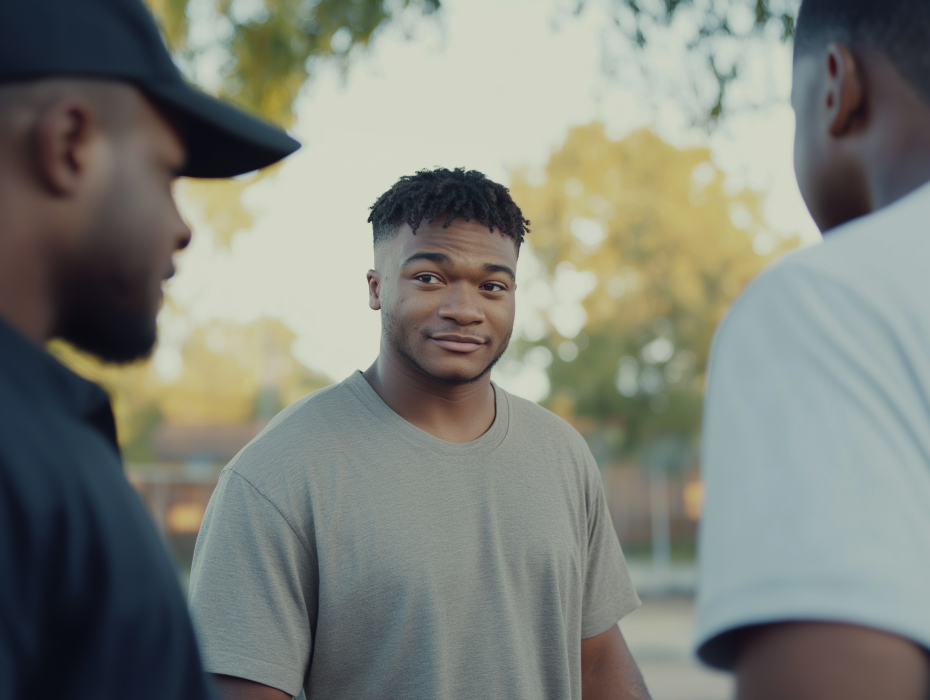
That night, tucking Emily into bed, she whispered sleepily. “He said he would keep me safe. Wonder when I’ll see him again.” She clutched her bear, eyes wide with solemnity. Michael kissed her hair, forcing calm, though her words gnawed at him long after she drifted into sleep. It could have been the ramblings of a child dreaming too.
The following morning, Michael straightened the garage shelves, searching for a wrench. Behind a stack of paint cans, he found work gloves too large for Sarah and too small for himself. The leather was worn smooth, smelling faintly of cedar. He frowned. Someone had been using them recently.
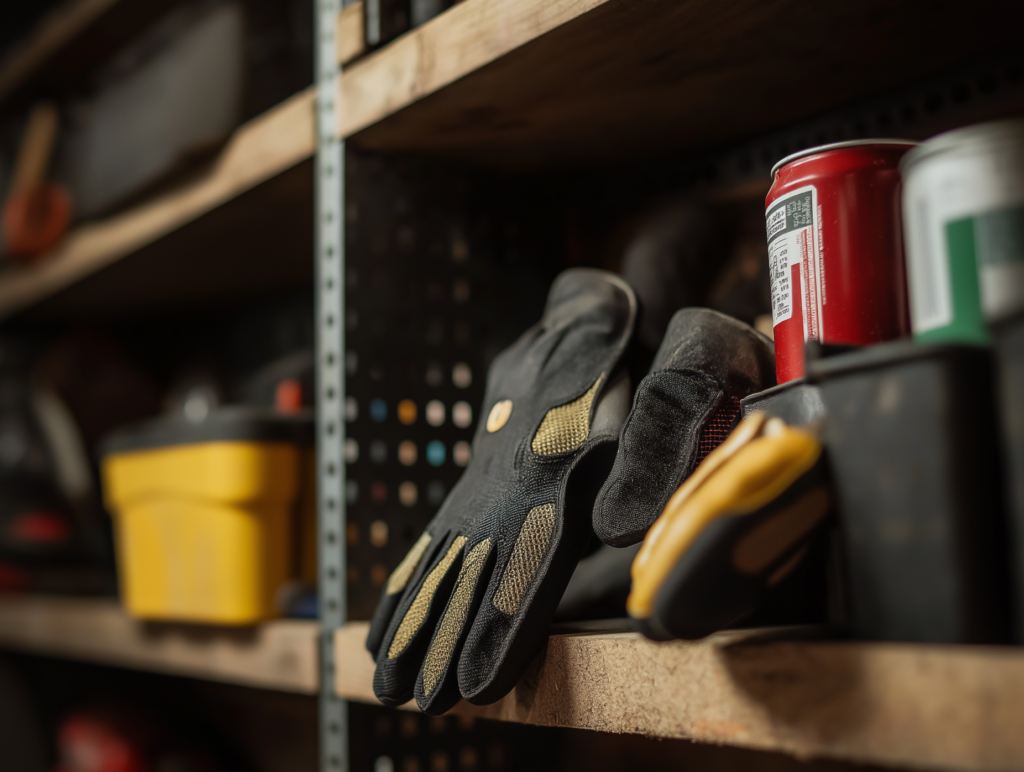
Sarah appeared in the doorway just as he slipped the gloves back. Her smile was quick, her voice airy. “Leave that mess, Mike. I’ll sort it later.” She disappeared before he could answer. Her deflection was light, but it stirred the unease that had been building quietly inside him.
On a sunny afternoon, Emily tugged him to the backyard. “Look, Daddy, the swing works again! He fixed it.” Michael pushed the swing gently, noting the new ropes and sanded frame. Sarah’s voice floated from the porch: “A neighbor helped.” Michael nodded, though he noted Sarah gave no name to this neighbor.

That evening, he found a folded receipt tucked into a drawer. It was a hardware store purchase for nails, wood sealant, and paint. The handwriting scrawled across the back wasn’t Sarah’s. He rubbed the paper between his fingers, feeling the ghost of a masculine presence weaving its way through his house.
Michael decided not to confront Sarah immediately. His years away had taught him the importance of peace. But, he watched more closely. One of the doors had been repaired, boards replaced with practiced skill. The basement shelves held new jars, neatly labeled. These were not Sarah’s touches. He knew her style. These were the hands of another man.

That night, Michael woke to the faint creak of floorboards above. He lay still, listening, breath held. After a long silence, he convinced himself it was the house and his unease in being in it for so long. Yet the unease held, as though the walls were sheltering more than just his family.
Sarah’s phone rang late the next evening. Michael answered, but silence filled the line—except for a faint rasp of breathing before the call disconnected. He stood with the receiver pressed to his ear long after, pulse thudding, wondering who wanted Sarah but wouldn’t speak to him.

In Sarah’s desk, Michael found a folded envelope of cash tucked beneath bills. A note lay on top in unfamiliar handwriting: For the groceries—more soon. No signature, just a firm, masculine scrawl. He shoved it back quickly, unsettled by the intimacy of another hand in his home.
Emily, half-asleep, whispered while he tucked her in. “He told me not to worry… he fixes things when they’re broken.” She clutched her bear tighter. Michael forced a smile, heart racing. Who was “he”? This did not seem to be an imaginary friend as Sarah insisted. He kissed her forehead, but her words looped through his mind like a haunting refrain.

At the grocery store, the clerk greeted Sarah with a warm smile, then blinked at Michael in surprise. “Oh—you’re back. Usually, he picks these up.” Sarah’s cheeks flushed, her laugh brittle. Michael said nothing, though his grip tightened on the bags. Sarah explained to him, “Our neighbors used to help in your absence.” Again, this neighbor remained unnamed.
That evening, in the attic, Michael’s flashlight landed on a thermos wedged behind a box. He unscrewed the lid—the scent of coffee still lingered faintly, fresh enough to rattle him. Someone had been here recently. Not a ghost of deployment-fueled paranoia, but a living presence under his roof.

At a neighborhood cookout, an older neighbor clapped Michael’s shoulder. “Good to see you back. Your family’s been well cared for.” The words were offered kindly, yet rang like an accusation. Michael forced a smile, but rage simmered. Cared for—by Sarah? Or whom? And why was everyone in on it but him?
That night, lying awake, Michael admitted what he had resisted for days. Sarah wasn’t simply hiding bills or stress. Someone else had been here—fixing swings, picking up groceries, leaving notes, drinking coffee in his attic. He clenched his fists in the dark, certain that while he was away defending his country, his very home was being invaded.

While folding laundry one morning, Michael found a pressed men’s shirt, size smaller than his. The label was crisp, the fabric smelling faintly of starch. He held it up, baffled. Sarah breezed in and claimed it was a donation she hadn’t delivered yet. Her tone was light, but her eyes avoided his.
Emily later hummed an unfamiliar tune while coloring. When Michael asked where she learned it, she answered innocently, “He taught me.” Michael’s chest tightened. Sarah interjected quickly—“Probably from her cartoons”—but Emily shook her head before falling silent, as though realizing she had said too much.

The garage smelled faintly of tobacco, though neither Sarah nor Michael smoked. Michael checked the bins and found cigarette butts buried under crumpled paper. “Maybe a repairman,” Sarah suggested with forced cheer. But the scent was fresh, recent enough that Michael’s skin prickled. Whoever it was, they had been here pretty recently.
One afternoon, Michael stopped by the hardware store. The clerk recognized Sarah’s name on his credit card. “Oh, picking up for her again?” she asked casually. Michael froze, his pen hovering. “Sure,” he muttered, before hurrying out. The picture of another man running Sarah’s errands sharpened, dangerously clear.
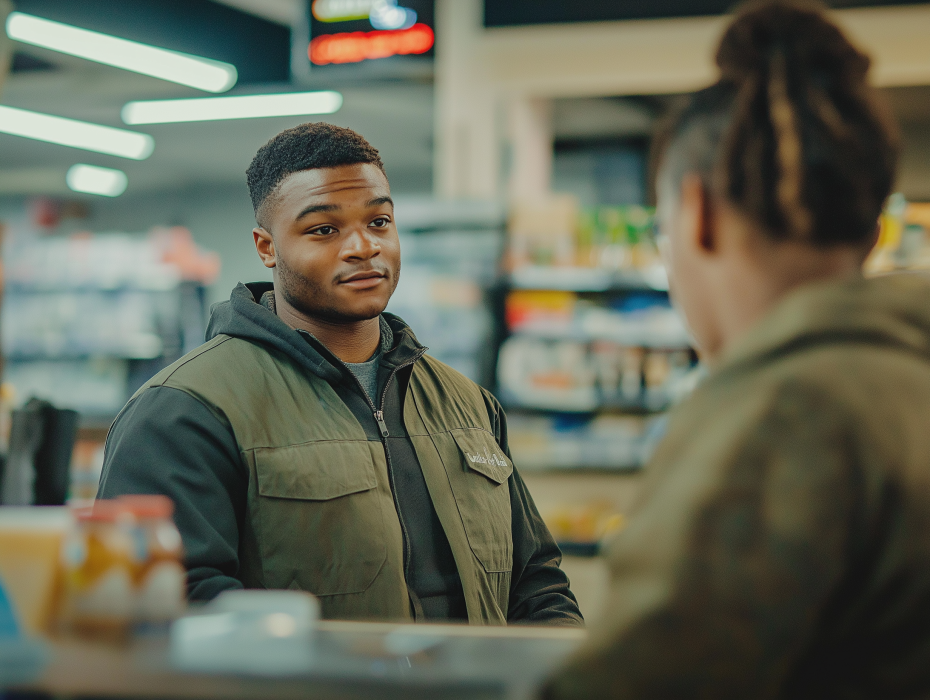
At bedtime, Emily whispered, “He said Daddy works very hard. That’s why he helps.” Her words were tender, but to Michael, they sliced like knives. Another man talking to his daughter about him? His jaw clenched as he kissed her forehead, masking his rage behind a steady father’s smile.
The next morning, Michael found muddy bootprints near the back door—too small for his, too large for Sarah’s. They trailed off toward the yard, where the soil was freshly turned as though something had been dug and covered again. Michael crouched, tracing the outline, heart hammering in his chest.
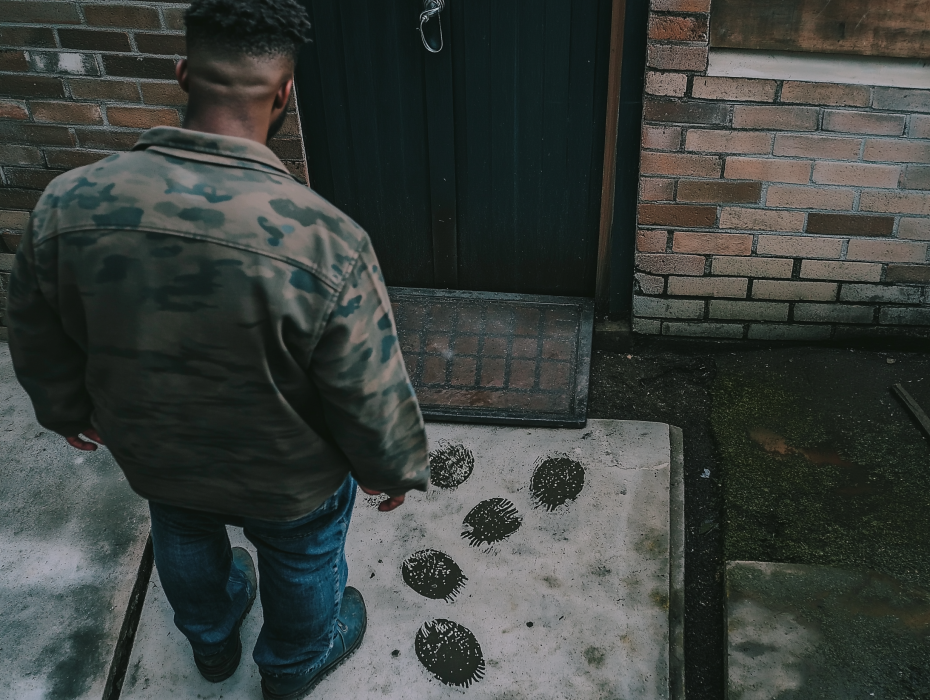
That evening, he knew he couldn’t sacrifice his need to know for domestic peace. He demanded answers. “Who’s been here, Sarah? Tell me the truth.” Her eyes flashed panic before she steadied herself. “Neighbors help sometimes. Stop imagining things.” Her calm words only deepened his doubt. If it was innocent, why did she tremble at his question?
Her phone rang again that night. Michael pretended to be asleep, but he knew Sarah had taken the call to the toilet, where she shut the door behind her. He heard the muffled talk from inside. Well, secrecy like that almost always pointed to one single thing. But he decided he would gather more proof before confronting her.
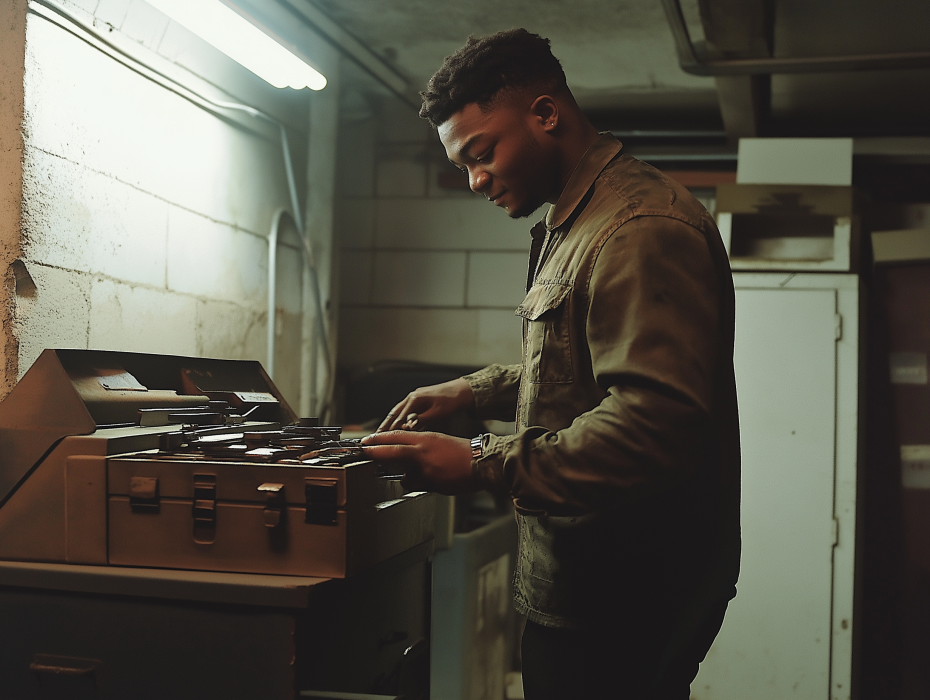
Michael searched the basement with fresh resolve. Behind boxes, he found a half-empty toolbox—old, battered, but not his. The tools were well-used, handles worn smooth by calloused hands. He held them like relics of an intruder, proof that another man’s presence had seeped into every corner of his home.
At a Sunday service, parishioners greeted Sarah warmly but cast Michael sidelong glances. One woman leaned close, whispering, “She’s done her best all on her own. Don’t be too hard on her.” Michael’s blood boiled. Her best at what? Why did everyone else seem to know the story while he stood blind in it?

Sarah began taking long evening walks. When Michael offered to join, she refused quickly, saying she needed solitude. Once, he followed at a distance, heart racing. She carried a tote bag. He followed her a while longer and then gave up. When she came back, the bag was no longer with her.
He asked her what she carried. “Donations for the pantry. We do it anonymously,” she replied briskly. He wanted to believe her, but her too-smooth answer sounded rehearsed. The image of the vanishing bag gnawed at him—transactions done in shadows never held good explanations.

Another evening, Emily pulled a small toy car from under her bed. “My friend gave me this,” she said proudly. Michael examined it—new, with a hardware store tag still dangling. Sarah appeared quickly, snatching it away. “That’s mine. I bought it for her.” Her voice wavered as she put away the toy.
Michael’s dreams grew darker. He saw shadows moving in his attic, heard footsteps pacing the halls. Each morning, he checked the rooms with a soldier’s caution, pulse tight, but always found nothing. It was as though the house itself mocked him, hiding the truth in plain sight.

One afternoon, while rummaging for batteries, he found a notebook shoved behind canned goods. Its pages were filled with lists—grocery items, repairs, errands. The handwriting wasn’t Sarah’s. The neat, steady lines spoke of someone disciplined, someone deliberate. Michael stared at it, bile rising, before shoving it back.
When he confronted Sarah, she folded her arms, her face taut. “Stop digging, Mike. Please. Not everything is a threat.” Her words landed cold, like a wall between them. She spoke of peace, but her eyes flickered with something else—fear. Fear of him uncovering what she refused to say.

That night, Emily crawled into his lap, whispering, “Don’t be mad. He said Daddy will accept someday.” Michael’s throat tightened. Accept what? He hugged her gently, but his gaze drifted past her to the locked desk drawer, the empty spaces, the evidence piling up like stones on his chest.
He couldn’t shake the feeling that he was the last to know the script in his own home. Even neighbors hinted at gratitude for a helper he had never met. Sarah tried to soothe him with kisses, but Michael lay stiff, consumed by the suspicion that his family was no longer his alone.

Sorting through the mail, Michael noticed a bank slip tucked among the bills. It showed a recent cash deposit into their joint account—large enough to cover several months of groceries. He hadn’t sent money home. He stared at the paper, a cold weight settling in his chest.
That evening, he placed the slip on the table between them. “Where did this come from?” Sarah glanced at it, her expression tightening. “A refund. Insurance.” She stood quickly, clearing plates before he could press further. Her voice was light, but the strain in it betrayed her.

Later, Emily skipped into the room carrying a small piggy bank. “He put money in here for me too,” she said proudly, shaking it so coins rattled. Michael forced a smile, but inside, his stomach clenched. Someone was not only helping Sarah—they were leaving gifts for his daughter.
The next morning, Michael found a folded envelope tucked into Sarah’s purse. Inside was a stack of twenties and a note in unfamiliar handwriting: For the week—don’t worry about it. He shoved it back quickly, heart pounding. The intimacy of the gesture felt like a violation.

At the grocery store, the clerk smiled warmly. “Running errands again? He usually comes on Fridays.” Michael’s blood chilled. “Who?” The woman blinked at his tone, backpedaling. “Oh—must have been a neighbor. Sorry.” But her words echoed all the way home. Someone had been standing in his place.
That night, he asked Sarah directly. “Who’s been giving you money? Who’s been here when I wasn’t?” She stiffened, her eyes glistening. “Please, Mike. Let it go. It’s not what you think.” But she offered no explanation, only retreating into silence that cut deeper than any lie. He couldn’t believe the woman he loved was turning into a stranger before his eyes.

Sleep deserted him. Each sound in the house fed his restless mind. He paced the hallways, staring at shadows, replaying the clerk’s words. He had faced mortar fire, ambushes, but never a ghostly rival who provided for his family while he fought half a world away.
Emily, half-asleep, whispered as he tucked her in. “He said he would help and that it’s a secret, but secrets can be good sometimes.” Michael smoothed her hair, masking the storm inside. Another man was teaching his daughter about secrets.

In the garage, Michael found a crumpled receipt tucked between toolboxes—cash withdrawn from an ATM across town, signed with Sarah’s name. The date matched a week he knew she had struggled to pay bills. But the handwriting scrawled on the back—Call me if you need more—wasn’t hers.
When he confronted her again, Sarah’s tears spilled freely. “I didn’t want you to come back to debt, to struggle. Someone helped us. That’s all. Don’t ask who.” Her voice cracked. To Michael, it sounded less like gratitude and more like guilt. He worried if his wife was in love with this other man. Did she plan to leave him?

That night, Michael sat in the darkened living room, the note clenched in his hand. The walls felt foreign, as though another man’s presence still lingered in every corner. He had fought wars abroad, but nothing had prepared him for the betrayal in his own home.
He told himself he’d uncover the truth, whatever it was. Every coin in Emily’s bank, every bill in Sarah’s purse, every neighbor’s pitying glance pointed to one conclusion—another man had taken his place, if not in Sarah’s heart, then in the life he thought was his alone.

That night, Michael read the message that popped up on Sarah’s phone. I think it’s almost time. Michael stared at it, blood pounding. Almost time for what? To take Sarah? To replace him completely? He placed the phone back, fists trembling with fury.
He found another note later, slipped under the front door: I’ll stop by soon to check the fence and see Emily. Michael read the words over and over, bile rising. The casual familiarity and the mention of his daughter were too much. He crumpled the note and threw it away.

Michael confronted Sarah again, his voice breaking. “Why? Why him? Wasn’t I enough?” Sarah sobbed, covering her face. “It’s not what you think.” But she wouldn’t elaborate. The vagueness only worsened the wound, confirming for Michael that she couldn’t admit the truth he already knew.
His days became restless watches. He lingered by the windows, scanning the street for strangers. Sometimes he caught sight of a figure—a broad back, a limp in the step—disappearing around corners. Each glimpse fueled his torment, a phantom rival haunting him just beyond reach.
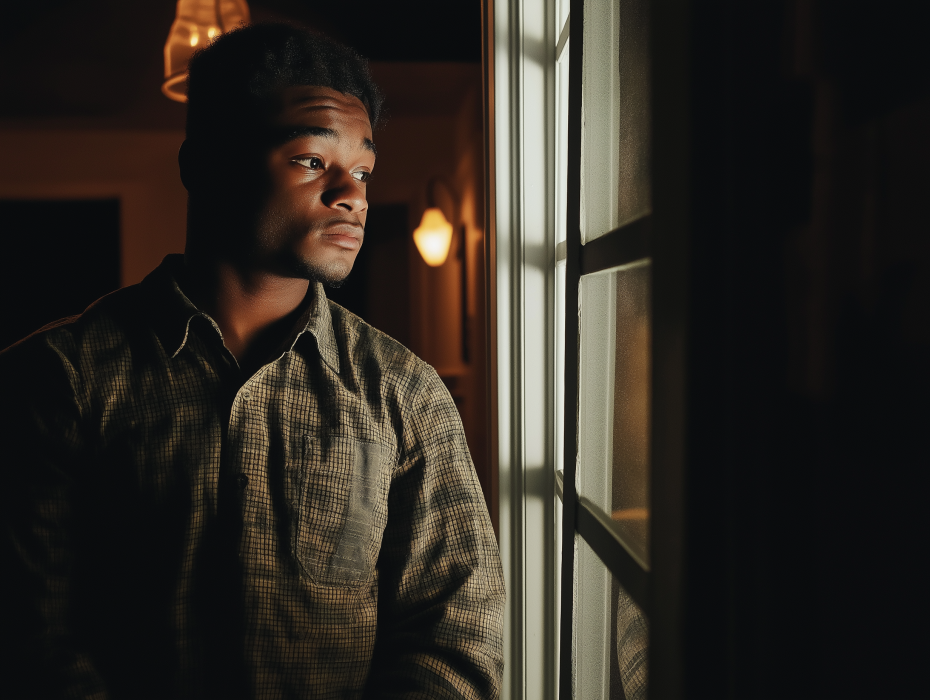
Emily, increasingly withdrawn, whispered, “He said he’ll explain it all soon.” Michael hugged her, fighting back the rage and sorrow boiling in him. His daughter spoke of the man like family, while to him, he was a nameless ghost tearing his life apart.
That evening, Emily climbed into his lap, eyes earnest. “Don’t be angry, Daddy. He said you’d understand, if you just listened.” Michael stroked her hair, torn between love and fury. Understand? He couldn’t even name the man who had been allowed this deep into his family’s life.

Michael lay awake, the house silent around him. The gloves, the shirt, the tools, the notes—they stacked like evidence in a case he couldn’t close. Betrayal seemed the only explanation. He clenched his jaw, resolved that the next time the shadow surfaced, he would force the truth out.
That evening, Michael sat hunched at the table, the latest envelope of cash spread before him. The note inside read simply: For Sarah and Emily—always. The words burned into him. He slammed the envelope down as Sarah entered, his voice shaking. “Enough. Tell me who he is.”

Sarah froze, eyes wide. “Mike—please.” He rose, towering over her, his hands trembling with fury. “He’s been here. He’s been giving you money. Even Emily talks about him. How long, Sarah? How long have you been letting another man into this house?”
Tears welled in her eyes, spilling over. “It isn’t what you think.” Her voice broke. “I didn’t know how to tell you. I was afraid you’d walk away again.” She covered her face with her hands, sobbing. “It’s not another man in that way. It’s your father.”

Michael went still, as if struck. His father’s face surged in memory: the shouting, the slammed door, the bitter words that drove him out. He had built his military life on the ashes of that argument. Now Sarah’s words cut through the years like shrapnel.
Sarah stepped closer, her voice trembling. “He came when you left. Said he wanted to help, to keep us safe while you were gone. I didn’t know if I should believe him, but he showed up with money, with groceries. He fixed little things. He meant no harm. In return, I used to occasionally cook him meals and drop them off where he’d pick them up.”

Michael staggered back, fists clenched. “You let him into this house? After everything?” His throat burned with rage and disbelief. Sarah shook her head. “I had no choice. We needed help. And he… he wanted to be part of your life again, even if only through us.”
Emily peeked from the hallway, clutching her bear. “Don’t be mad, Daddy. Grandpa told me stories. He said you’re brave, and he’s proud of you.” Michael’s knees weakened. The word—Grandpa—landed like a blow. His daughter had known the man he had sworn never to see again.

Sarah wiped her tears. “I should have told you. But I was afraid—afraid you’d feel betrayed, afraid you’d hate me for letting him near. He swore he’d never force you to see him. He just wanted to help, to prove he isn’t the man you remember.”
Michael’s chest heaved as anger and grief battled inside him. He thought of the envelopes, the toys for Emily, the quiet support that had steadied his family while he fought abroad. Each clue now felt less like a rival’s trespass and more like a father’s silent apology.

He dropped into a chair, burying his face in his hands. Memories of slammed doors and words spat in fury churned through him. For years, he had believed his father had abandoned him. But now, the truth whispered a painful question—had he been the one to walk away?
Sarah knelt beside him, her hand trembling on his arm. “He’s still out there, Mike. He wanted me to tell you only when you were ready. He knows the hurt runs deep. But he hasn’t stopped trying. Every note, every dollar—it was him, hoping you’d understand someday.”

Emily’s voice piped up again, soft and earnest. “He said he loves you, Daddy. Even if you’re mad.” She climbed onto his lap, her small arms encircling his neck. Michael hugged her tightly, eyes stinging, the bitterness of old wounds colliding with the fragile innocence of her words.
Michael swallowed hard, staring at the envelope on the table. The money no longer looked like an intrusion, but like a clumsy bridge built out of guilt and love. His father hadn’t come to replace him—he had come to make amends, in the only way he knew.

For the first time in years, Michael allowed the possibility to take root—that reconciliation wasn’t impossible, that a father’s presence need not remain only in shadows. He looked at Sarah and Emily, their eyes filled with hope and fear, and whispered, “Maybe it’s time I heard him out.”
